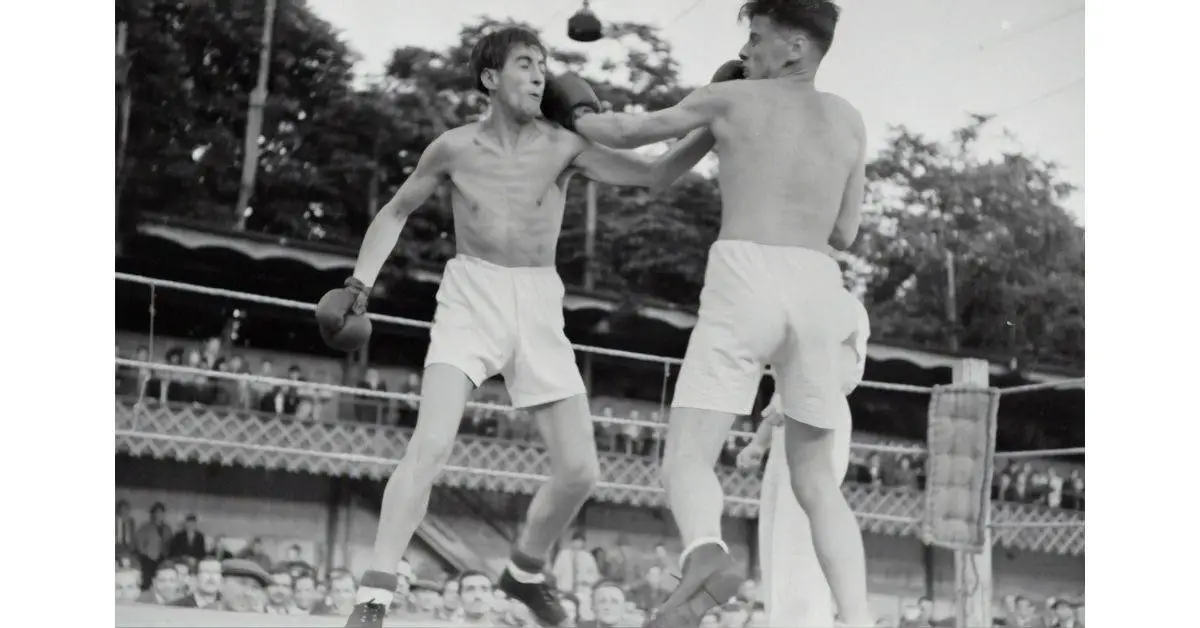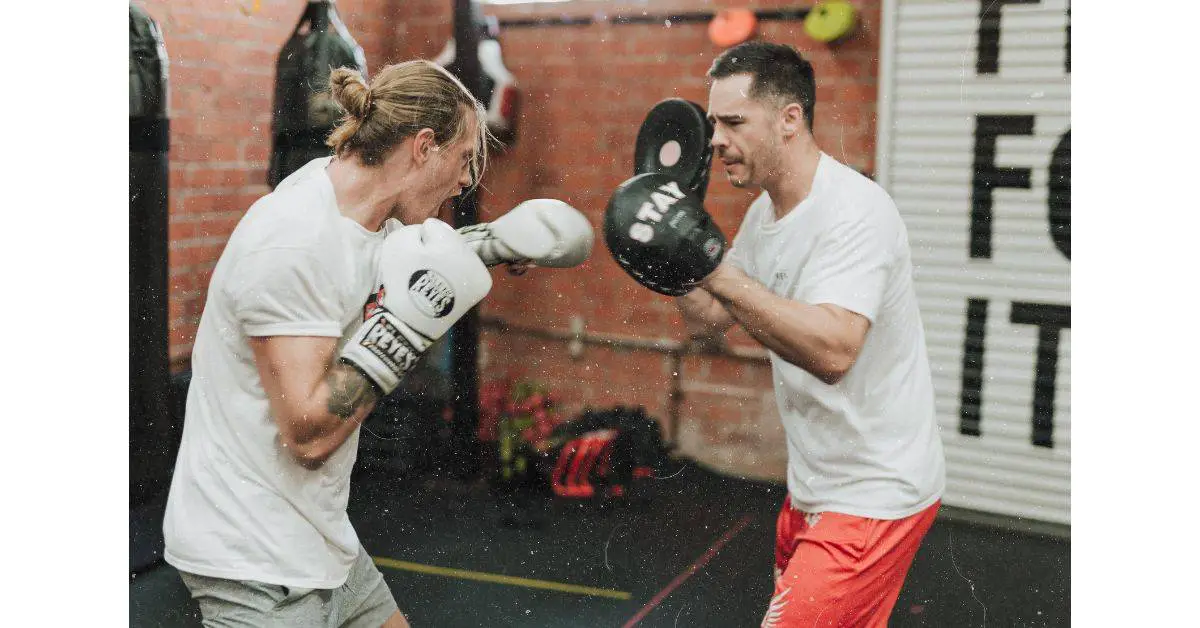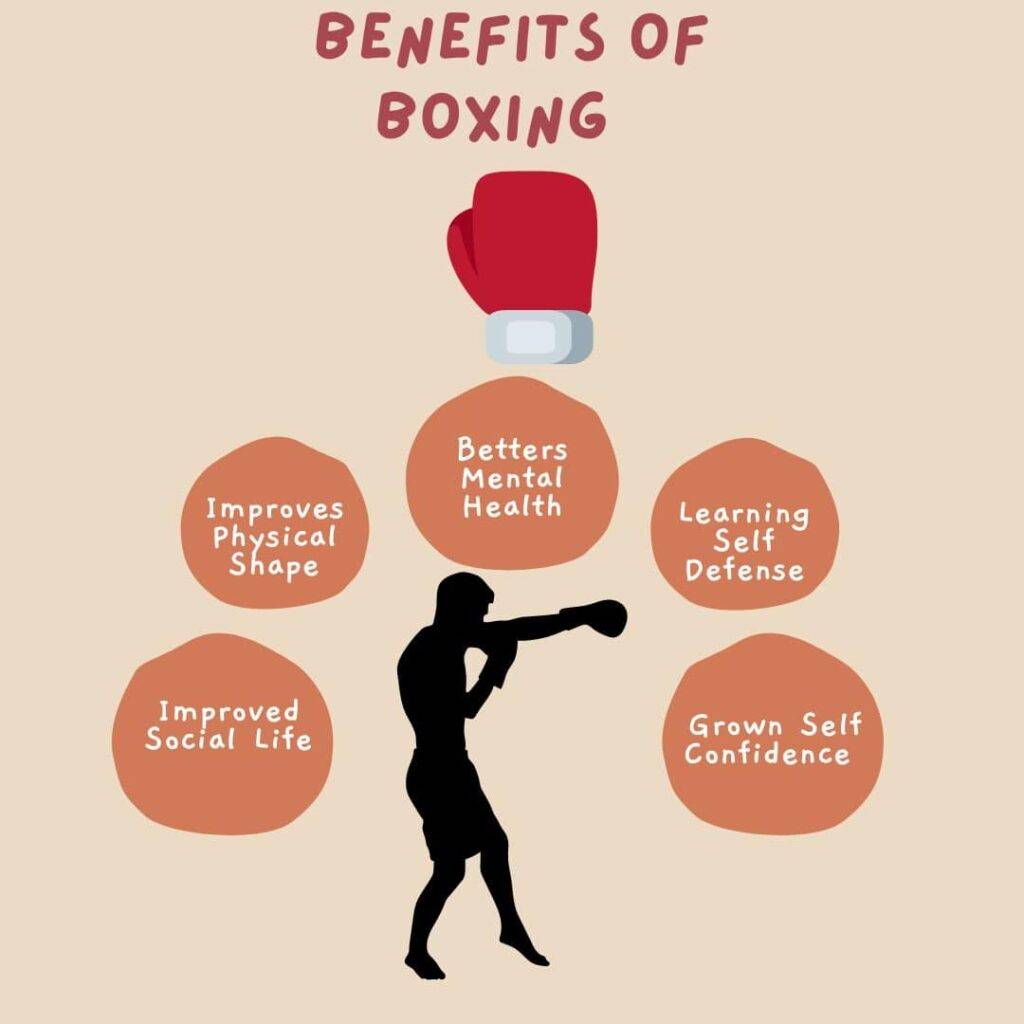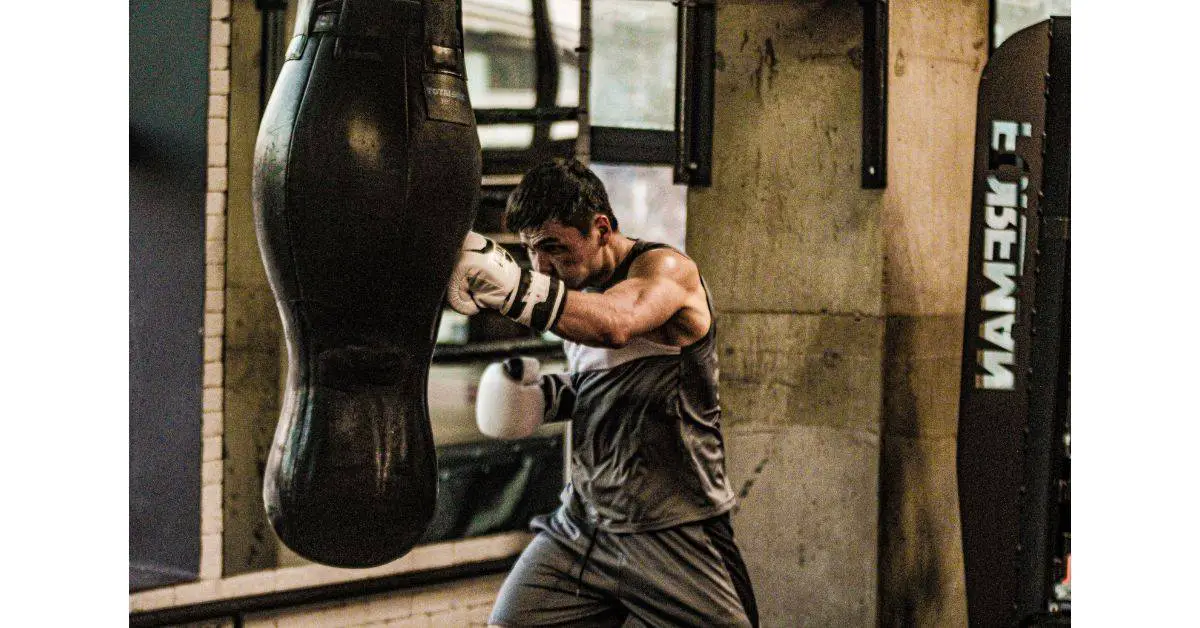If becoming a boxer—is something you lust over—you need to learn how to do it. However, you also need to be loose and learn as you go. But, most importantly, you must remain consistent. So, let’s see how you can do so in a step by step manner.
To become a boxer, you need to get your amateur boxing license. Then, you need to fight to get your name out there. Once you reach a certain stage, you’ll be able to get your hands on a professional boxing license. To reach that stage, you must remain as consistent and dedicated as possible.
It’ll be best if you find a boxing gym to your liking. Then, start your training and learn from everyone. If you adopt that mindset, you’ll be able to learn plenty from anyone and everyone. As a result, you’ll progress faster and get yourself on a professional fight sooner.
Some boxers think they’re the best in the world. Nevertheless, that alone stops them from progressing further, as they stop learning from people who know more than them. Likewise, once an external set of eyes sees you, you can get feedback.
This article will discuss the steps you need to take to become a boxer. Additionally, I’ll give you some tips to ensure you progress and learn as much as possible in the shortest time. As a result, you’ll get yourself in your first fight sooner than you think.
Before we dive in, I encourage you to follow the link to read about the best boxers in the world. Knowing these individuals—will help you learn from the elite.
The complete guide to becoming a boxer
Your first step to becoming a professional boxer—is to become an amateur one. This is the first hurdle most people face when deciding to go for it. In fact, it’s what discourages some people. They think of the distance between them and the end goal; that alone stops them from staying consistent.
Let’s first discuss the hurdle of becoming an amateur boxer. If your end goal is to become a professional boxer, you must go through a series of qualifications to get your hands on that title.
The first hurdle, both the people who desire to become amateur and professional boxers—is to become amateur boxers.
Eventually, it’s a hard-to-reach goal. While you may not currently see yourself reaching that title, you must trust the process and believe in yourself. When both conditions are met—you’ll progress rapidly.
How to become an amateur boxer
Let’s first discuss how to become an amateur boxer. Before we go into detail, it’ll be best if you understand one major thing; dedicating yourself to boxing—is difficult—no matter your goal.
You’ll be sweating for hours on end. As a result, you’ll be prone to quitting in the middle of the learning process. When you see that happening, however, stop yourself in your tracks. Continue learning, especially when it gets difficult.
Here are the list of actions you’ll need to take to become an amateur boxer:
- Start training
- Pick a gym
- Adopt a coach
- Learn from anyone and everyone
- Improve your boxing skills
- Stay consistent
- Dedicate yourself to the art of boxing
- Get your amateur license
- Sign up for your first fight
Alright, let’s examine this 9-step list and really dig into it. First, the most difficult part won’t be what you think. The hardest step is staying consistent and remaining humble.
Our minds habituate themselves to feel superior to others. Likewise, it’s habituated to feeling inferior to others. However, once you see positive feedback all around, you won’t be as prone to learning from others.
But, if you stay consistent, that’s when you can move forward to the next steps. Eventually, once you become solid in the craft, you’ll be able to get your hands on an amateur license.
How to get your amateur boxing license
To get your amateur boxing license, find a certified boxing gym in your country. For example, USA boxing is a gym that’s certified to grant you such a license. Once you do that, you’ll need to see a cardiologist, neurologist, and pass a physical exam. You’ll also go through a series of physical exams, such as blood pressure.
If you want to amp up your boxing game by buying a high-quality pair of boxing shoes, follow the link to find out which are the best ones for your money.
Once you get your license, you can sign up for your first fight. At first, it’ll be best if you fight more than the average. Your name, as a result, will get out there in the boxing community.
Eventually, that will lead to opportunities to becoming pro; here’s how to do it:
How to become a professional boxer
Now that we know how you can become an amateur boxer, let’s discuss how to move that forward and become professional. So, what is a professional?
According to Oxford Languages, it is someone engaged in a specified activity as one’s main paid occupation rather than as a pastime.
So, the main difference between an amateur and a professional is how each one sees boxing. While the first doesn’t see himself as being a full-time boxer, the other does. As a result, to become a professional, you must also act like one. Hence, take your training more seriously.
To become a professional boxer, you must first become an amateur boxer. Then, once your name is out there, and you won some fights, you can apply to get your license. More often than not, the primary boxing organization in your country or state—is where you’ll get it.

You’ll be going through various physical, mental, and psychological tests to ensure you’re suitable for that title. If you’re found fitting, you’ll be getting your license after proceeding with each state’s procedure.
Here are the steps:
- Become an amateur boxer
- Fight consistently
- Get your name out there
- Apply to your local boxing organization
- Get your professional boxing license
- Start fighting professionally
Those who achieve this title—are the ones who have put in all the effort in the beginning in order to remain consistent. Likewise, they’ve dedicated themselves to the craft, even when they didn’t really feel like training. That alone is what made them such solid boxers.
| State | Boxing organization to apply to |
|---|---|
| Missouri | Office of Athletics |
| Texas | Combative Sports Program |
| New York | Athletic Commission |
| California | California State Athletic Commission |
| Florida | Florida State Boxing Commission |
Finding your local boxing organization isn’t that difficult. If you’re unable to find it online, you can ask in a forum that is specifically about your place of living. If that doesn’t succeed, go to the elite boxing gym in your state or country and ask there.
Tips to become a boxer faster
This section will discuss four tips you can follow, starting from today, to amp your boxing abilities a notch. Eventually, they’ll help you progress and learn faster—while remaining more consistent and dedicated with your training.
I do see a pattern with these tips; they’re relatively obvious. And still, they’re the most crucial ones to your success in the world of punching. As a result, I encourage you to emphasize involving them inside your punching lifestyle.
Avoid overtraining
The first tip is to avoid overtraining. At first, you’re excited and eager to start your training. However, as time progresses, you become less and less excited to attend the following boxing session.
In the beginning, you’re more likely to train more, as you’re eager to attend the following session. Because of that, it’ll be best if you follow a training routine, so you’ll be able to ensure you don’t cause overtraining in your muscles.

If you want to ensure you don’t overtrain, follow the link to an article where I explain everything related to avoiding overtraining.
Stay consistent, especially when you don’t feel like it
The second tip is the most obvious one. And still, most people fail in it; so let us dive deeper. What is the most common action people take to feelings of not wanting to do something? Precisely, they don’t do it. That’s why you see individuals listening to their feelings too much. Thus, they give up on their major goals.
If you attend your boxing session, even when you don’t want to, you’ll ensure your future in the boxing world. That is all it takes to stay consistent; attend training whenever you don’t feel like it.
Once you do that once or twice, your body and mind will understand you’re not fooling around (bro science alert). As a result, you’ll stay consistent in the long-term. Don’t let yourself skip a few sessions for instant-gratification.
Have a purpose
The next tip is to always have a purpose. What’s the goal in life if not to work toward something. If, for instance, you think you can achieve a particular goal, let it be small or major, without having a reason fueling your motivation—think again.
You simply won’t be able to achieve anything worthwhile without a solid reason fueling you. I wouldn’t have been able to start doing Muay-Thai if not for me wanting to learn self-defense. Likewise, I wouldn’t do boxing if it weren’t for me wanting to improve myself.
Your purpose can literally be anything, as long as it’s long-term. Here are some of my favorites; you can adopt one of these to yourself:
- Learning self-defense
- Losing weight
- Gaining muscle
- Meeting new people who want to improve themselves
- Building the perfect body
- Increasing your confidence
- Improving your self-esteem
- Reducing your stress
These are the ones I believe most people can relate to. If you truly want to achieve one of these, let it be your purpose; what’s driving you to attend the following boxing session.
If you want to see more purposes to start boxing for, follow the link to read another article of mine on the topic.
Keep yourself accountable
Keeping yourself accountable—can be detrimental to boosting your progression rate. If nobody checks you’re doing well, you may as well not be doing anything. That’s why the elite of the elite always keep themselves accountable.
Here are some of the benefits of accountability, according to OPM:
- improved performance,
- more employee participation and involvement,
- increased feelings of competency,
- increased employee commitment to the work,
- more creativity and innovation, and
- higher employee morale and satisfaction with the work.
Although it’s not as relevant to boxing, you can see why it can benefit you in your boxing journey. If you have someone constantly looking out for you, you’re more likely to do the hard work, even when you don’t feel like it.

I’ve seen my friend succeeding with this when he chose me as his accountability partner. My friend, let’s call him Kyle, always wanted to lose weight. However, he was the type of person to always start a diet and let it go after two days.
However, he saw this working with other people in his life, so he tried it as well; he sent me daily pictures of his morning weight, before he could eat anything. Whenever he didn’t send me these pictures, I would call him out for not doing the hard work.
What do you think happened in consequence of that? He lost the weight he wanted to lose and adopted a healthy lifestyle. All of that happened because I tracked his progress; he simply didn’t want to look bad in front of his friend.
You can do the same, with boxing!
How long does it take to become a boxer
Becoming a boxer takes hard work and consistency. Times will come where you’ll want to quit. However, those who are at the top—are also the ones who trusted the process and let go of their doubts.
There’s no specified amount of time required to become a boxer. To become a professional one, however, you’ll need to first get your amateur license and fight plenty of times. Only then will you be able to get your professional license. You become a boxer the minute you decide you are one.
The title of a boxer—is something most people never think of giving themselves. When you walk into your boxing gym, how do you see yourself? Do you see yourself as the type of person who will stay consistent and dedicated to the art of punching no matter what? If so, you’re a boxer.
Nevertheless, you can be a boxer the minute you decide you are one. So, don’t hesitate to give yourself that title.
If you want to learn the best boxing defensive moves, be sure to follow the link to an article of mine on the topic.
Can I become a boxer at any age?
Knowing when to start your boxing journey—is critical for your long-term success. The primary rule of thumb is to start as soon as possible. If you’re 50 years old and haven’t had your hands in boxing gloves ever, it’s time to start your training.
You can become a boxer at any age because there’s no restriction by the main boxing organization. That said, it’ll be best if you start training in your “prime years”, when your body is able to recover faster. Most boxer retire in their mid 30s. That said, some of them retire earlier or later than that. /

While most professional boxers do retire at around 35, some of them do so much earlier and others much later. So, it’ll be best if you start as early as possible, so you can make an impact on the boxing world.
Benefits of boxing
The benefits of boxing are many. If you truly want to know all the reasons to start training in boxing, follow the link to an article of mine breaking down the topic.
If you want to better both your mental and physical selves, boxing is a fantastic starting point. You’ll be improving yourself after every single training session. As a result, you’ll also be more motivated and eager than ever to attend the upcoming session.
Here are the benefits of boxing:
- Reduced stress
- Lower aggression and violence levels
- Knowing to fight
- Better physical shape
- Better endurance
- Increased testosterone
- Higher confidence
- Improved self-esteem
- Better mental health
- Feeling safe
- Being able to protect people

As you can see, the list of benefits are plenty. Earlier in this article, we discussed the importance of having a purpose. The above list is a fitting resource to choose your purpose from. If you want, for instance, to improve your mental health, you can box.
As a result, you’ll pick that as a purpose; essentially, letting that goal fuel your motivation. And, once you’re satisfied with the outcome, you can even move on to another purpose.
Learn more about the mental benefits of boxing—by following the link.
How much do boxers make?
Knowing how much boxers make—is crucial before diving into a new path. It’ll be best to know such details before making a choice you might regret. So, here’s how many professional boxers make:
Many aspiring professional boxers might be surprised to learn that the median pay for a boxer is $51,370. In other words, half of the active professional fighters today made less money than this. The lowest 10% of professional boxers earn less than $19,220 annually, and only the top 1% make more than $1 million annually.
Eventually, you may not make a satisfied amount to your current needs. As a result, it’ll be best if you think carefully before taking a step you might later regret.
If you want to know how much money the highest paid boxers in the world make, follow the link to an article of mine on the topic.
How do boxers turn pro
Turning pro in boxing—means you’re capable of competing in the elite levels. Most boxers will never reach such a point, as they’re unwilling to take the leap of faith into new careers. Which, of course, is a valid choice.
Boxers turn pro by first getting their amateur license. Next, they begin competing as much as possible—so their names will get out there to the boxing community. Once they’re rather known, they get their professional license. Finally, they begin competing professionally.

Getting both your boxing licenses will require you to pass various physical, psychological, and mental tests. So, you may not pass these tests for various reasons. As such, before attending them, ensure you go over their content.
Final words
To end this article, I want to show my appreciation for boxing. Truly, it has positively impacted the lives of many. As a result, I owe my gratitude to the art of punching, as it benefited so many people.
Becoming a boxer—will require plenty of effort and dedication. You’ll need to attend training, even when you won’t feel like it. Although it’ll get difficult at times, you must stay vigilant and trust the process.
Although I haven’t even turned amateur, I want you to understand that doing so—is possible if you keep training. Your goal may be to start fighting as soon as possible. In that case, you can, indeed, follow your purpose and eventually get your hands on a professional boxing license. Don’t think it’ll be a walk at a park, tho.
If you enjoyed reading this article, you’ll also enjoy reading about tips and tricks to progress faster in your boxing journey. If you want to turn pro fast, I encourage you to read it.

